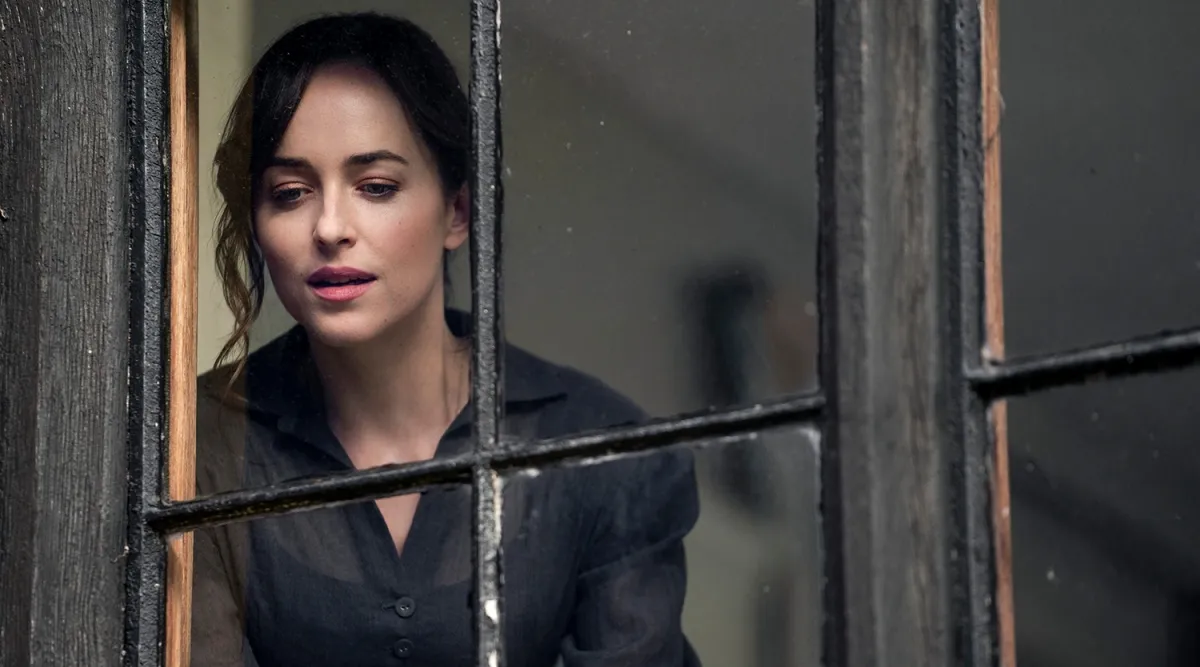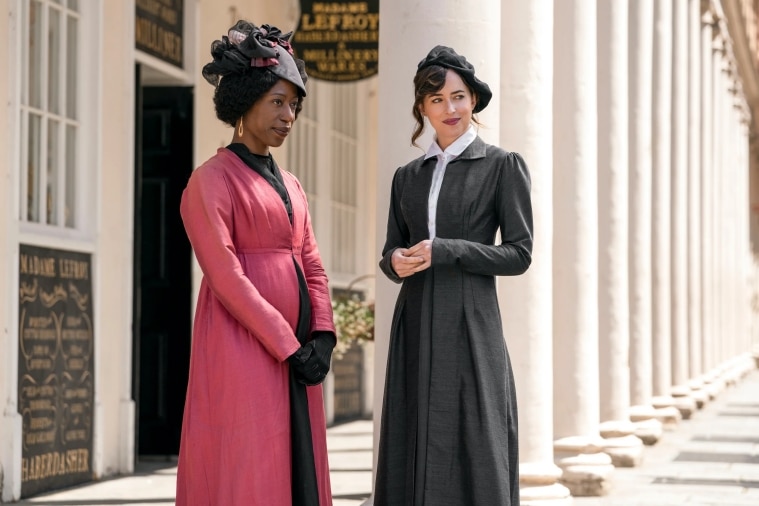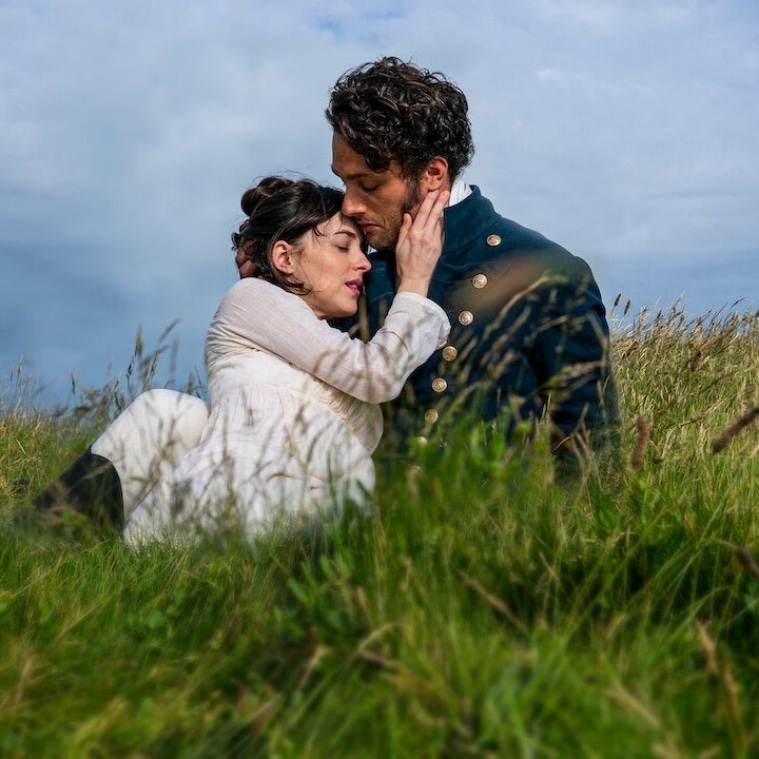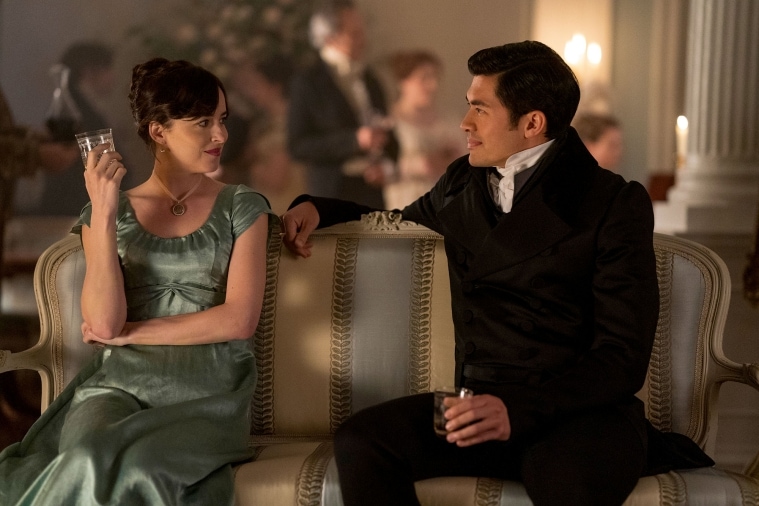 Netflix's Persuasion is a giant glossy canvas, on which blobs of colour have been merrily, and inexpertly, flung.
Netflix's Persuasion is a giant glossy canvas, on which blobs of colour have been merrily, and inexpertly, flung.If you watch Persuasion, now streaming on Netflix, as just another movie, you will find it a harmless, light, possibly even pleasant romance. Dakota Johnson dazzles, the locations are beautiful, everyone wears pretty clothes, and the side characters perform better than the script demands of them. But if you happen to be a Jane Austen fan — then, however, err err.
Austen had once described her work as “a little bit of ivory, two inches wide”, on which she worked with a “fine brush”. Austen was being modest, but her work does have the delicate finesse of an exquisite ivory miniature.
The Netflix movie, on the other hand, is a giant glossy canvas, on which blobs of colour have been merrily, and inexpertly, flung. Neither the heroine nor the movie can decide whether they want to remain loyal to Austen or to trendy cool girl-ism.
Termed ‘the perfect novel’ by literary critic Harold Bloom, Persuasion is the story of Anne Elliot and Captain Frederick Wentworth. Anne and Wentworth fall in love, but swayed by her wealthy snobbish family, she refuses the promising-but-penniless man. Eight years later, Wentworth returns as a rich Naval Captain, and they are thrown in each other’s path. It is a bittersweet romance, playing perfectly with the pull of longing and the push of circumstances and human flaws.
Subscriber Only Stories
Carrie Cracknell’s Persuasion, for some reason, chooses to be a romcom. Only, neither the rom nor the com is particularly well done.
If the intention was to make a romcom, why not take up Pride and Prejudice or Emma, the “light, bright, and sparkling” works that lend themselves more easily to the genre? If the intention was to show a simmering romance, why give the heroine a flare that washes out everyone else, including the hero? If the intention was to ‘modernise’ Anne, why limit her alleged new spunk to wisecracks at the camera?
Anne gets a glow-up, not a grow-up
Movie-makers will seemingly never get the memo that Austen’s heroines are not the prettiest girls in her novels. Thus, in Cracknell’s hands, the sweet, gentle, strong and dignified Anne Elliot, whose “bloom had faded”, metamorphoses into a sassy, klutzy, and of course sexy being, who can’t decide if she is Anne or Bridget Jones or Fleabag.
At 27, Anne is the oldest Austen heroine, restrained and collected. Johnson’s Anne has a personality any teen rebel will be proud of. While Austen’s Anne had a quiet strength and resilience, Johnson can’t go through her pain without drinking, lying facedown on the bed, and constantly chattering at the camera.
The problem here, apart from the very definite de-Austenification, is the poverty of imagination for a female lead. A woman protagonist has to be loudly witty and loudly pretty, because intelligent, shy introverts are not worthy of being the lead, and because the only evidence of ‘spirit’ in a woman is holding spirited exchanges.
 While Austen’s Anne had a quiet strength and resilience, Johnson can’t go through her pain without drinking, lying facedown on the bed, and constantly chattering at the camera.
While Austen’s Anne had a quiet strength and resilience, Johnson can’t go through her pain without drinking, lying facedown on the bed, and constantly chattering at the camera. Language – lost in unnecessary translation
For reasons obscure, the movie keeps some of Austen’s original dialogues while replacing the rest with resolutely peppy, and emptily generic, phrases. The effect is as harmonious as beautiful mahogany antiques in a room furnished with cheerful plastic.
Thus, to give one example, “now they were as strangers; nay, worse than strangers, for they could never become acquainted. It was a perpetual estrangement”, becomes, “now we are worse than strangers, we are exes”. Characters say “I am half agony, half hope” minutes after saying “Good talk”, and discuss “self love, play lists, and being an empath” in 18th-century syntax. Topped with emoticons.
Captain Wentworth, wronged all over again
If Anne’s character has been badly re-imagined, no attention at all has been paid to poor Captain Wentworth. Austen’s kind, confident, conflicted, gentlemanly hero is reduced to a regular jilted lover who pulls long faces, cribs about his ex, thinks his potential wife may not be able to bear the stress of a Naval officer husband, is jealous of men who cross Anne’s path. In the novel, he was too proud to realise how much he loved Anne, in the movie, he rather pathetically asks her, “are we finished?”
Even his final letter, the grand climax of the book, is not given the dignity of the original, but has trite, juvenile sentences introduced.
 Cosmo Jarvis plays Captain Frederick Wentworth.
Cosmo Jarvis plays Captain Frederick Wentworth. No room for subtlety or consistency
Austen constructed her world in vivid, alluring detail, as much by what she said as what she hinted. The movie hits you on the head with details, because you may not be smart enough to catch hints.
Thus, each character over-verbalises their feelings, jokes are emphasised with laboured exchange of smiles and glances, and a lover’s reunion is thrice underlined by kissing, chirping birds and background music.
Added to this are lazy incongruities about the time period the movie is based in. An Esquire’s house, Uppercross, is grander than Hogwarts Castle. In a world governed by rigid rules of hierarchy and dressing, Anne’s Baronet father asks her to “answer the door”. Anne wears mourning black, used only in bereavements, because the viewer must know she is sad. Her nephews, too young to go to school, play French Revolution-inspired games with her. She steps out in public in a braid she probably slept in.
 The movie hits you on the head with details, because you may not be smart enough to catch hints.
The movie hits you on the head with details, because you may not be smart enough to catch hints. The alleged modernity
We know the Netflix movie is “modern” because the characters make sexual innuendos and Lady Russel, Anne’s guardian, goes to Europe for “company” (wink wink wink). And yet, while Austen was daring enough to introduce a mistress, the movie’s Mr Elliot duly gets his holy matrimony.
Austen’s Anne, when talking about how men and women feel love differently, had said, “I believe you [men] equal to every important exertion… so long as you have an object. I mean while the woman you love lives, and lives for you. All the privilege I claim for my own sex (it is not a very enviable one; you need not covet it), is that of loving longest, when existence or when hope is gone.”
While this speaks of loyalty and constancy without the promise of a reward, which can only come from strength of character, the “fiesty” Johnson says, “Women love beyond all sensible limits…loving because you don’t have a choice”, implying an insipid lack of agency.
Towards the end of the movie – where we see a wedding and a scene of post-marital bliss, because how else do you know the lovers are happy – Lady Russel, at her wards’ wedding, is fingering a Europe trip (wink wink wink) card, which advertises that the trip will be “elegant and discreet”. Interesting choice of words, for the movie is neither.
- The Indian Express website has been rated GREEN for its credibility and trustworthiness by Newsguard, a global service that rates news sources for their journalistic standards.

